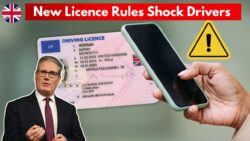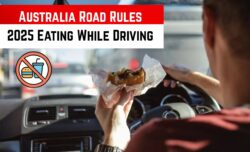The UK’s Driver and Vehicle Licensing Agency (DVLA) has recently introduced three major rule changes that all drivers must be aware of this week. These new regulations aim to improve road safety, reduce fraud, and make driver record management more efficient. From stricter penalties for outdated documents to enhanced vehicle registration checks, these updates affect millions of motorists across England, Scotland, Wales, and Northern Ireland. It’s crucial for every driver to stay informed about these changes to avoid penalties or even losing their driving privileges.

New DVLA Licence Renewal Rules for UK Drivers
The DVLA has tightened its policies on licence renewal for drivers aged 60 and above. Now, every driver must renew their driving licence every three years instead of ten, ensuring regular health and eyesight assessments. This change aims to enhance road safety and keep senior drivers fit for driving. Drivers who fail to renew on time may face suspension or fines. The rule applies to both paper and photocard licences. It’s advised to apply online through the official GOV.UK website to avoid postal delays or processing backlogs.
Stricter Vehicle Registration & Taxation Verification
Another new DVLA rule introduced this week involves mandatory verification for vehicle taxation and registration details. Drivers must ensure their car’s tax and registration records are up to date, or they risk receiving penalty notices automatically generated by DVLA systems. The agency has improved its digital monitoring network to cross-check records with insurance and MOT databases. Unpaid taxes or unregistered vehicles could result in clamping or impoundment. This new system focuses on making compliance smoother and discouraging road users from avoiding vehicle duties.
Heavier Penalties for Driving Without Updated DVLA Records
Under the new rules, drivers who fail to update their address, insurance, or vehicle ownership details with the DVLA could face fines of up to £1,000. This update was implemented after several cases of missed official correspondence led to licence suspensions and court summons. The DVLA now recommends checking records regularly online to ensure that all personal information remains current. These measures are part of the broader “Digital Driving Initiative 2025,” aiming to make UK’s driving administration fully online and fraud-free.

Impact on UK Motorists and Compliance Tips
The latest DVLA rule changes have a direct impact on millions of UK motorists. To stay compliant, drivers should:
- Renew their driving licence before it expires, especially if they’re over 60.
- Regularly check vehicle tax, MOT, and insurance details online.
- Update their address or ownership details promptly after any change.
- Use official GOV.UK portals to complete DVLA-related updates securely.
Failure to comply with these updates can lead to fines, vehicle seizure, or licence suspension. The DVLA advises all drivers to stay informed through official communication channels and avoid fraudulent third-party websites.
| Rule Change | Effective Date | Key Requirement | Possible Penalty |
|---|---|---|---|
| Licence Renewal for Over-60s | October 2025 | Renew every 3 years with health check | £1,000 fine or licence suspension |
| Vehicle Registration Verification | October 2025 | Ensure tax and registration details updated | Vehicle clamping or fine |
| DVLA Record Update Rule | October 2025 | Update address, insurance & ownership | £1,000 fine or legal notice |
FAQs – 3 New DVLA Rules for UK Drivers
Q1: When did the new DVLA rules come into effect?
A1: The new rules started this week in October 2025.
Q2: Do the new rules affect all UK drivers?
A2: Yes, the regulations apply across England, Scotland, Wales, and Northern Ireland.
Q3: How can I renew my driving licence under the new rule?
A3: You can renew online via the official GOV.UK portal or through local post offices.
Q4: What happens if I don’t update my address with the DVLA?
A4: You could face a fine of up to £1,000 and risk losing your licence.





